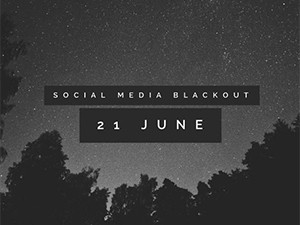
Thousands of frustrated smartphone users across the country have pledged to abstain from using social media today in protest against high data prices.
The hashtag #SocialMediaBlackout is being used (while people are connected to a WiFi hotspot) to highlight the problem. The campaign was ignited by poet and musician Ntsiki Mazwai.
She tweeted yesterday: "I will not be on social media on Wednesday, 21 June because #DataMustFall and it is long overdue we took action. Don't buy data. Don't login."
She said data costs are "obscene" and unaffordable for the people on the ground. "This is the information age, we NEED accessible data," and encouraged her followers to be strong, disciplined and resolute.
This campaign follows the #DataMustFall movement last year. Led by media and radio personality Thabo Molefe, popularly known as Tbo Touch, the social media campaign called on operators to lower the cost of mobile data.
While Parliament's portfolio committee on telecommunications and postal services did host public hearings with stakeholders, mobile operators and civil society organisations on the cost to communicate in SA, there has been no reduction in data costs.
Currently, 1GB of data costs Telkom users R99, Vodacom and Cell C users R149, and MTN users pay R160.
Arthur Goldstuck, World Wide Worx MD, says: "People are becoming more and more dependent on social media and instant messaging. Video consumption has skyrocketed, and one can see all of this in the significant increase in data as a share of revenue for the operators.
"In the next year, data will overtake voice. This also tells you that people are heavily dependent on data for communication, and that need will outweigh calls for a boycott of data."
He says #SocialMediaBlackout is presently the number one trending topic in SA on Twitter, which is an indication the campaign hasn't worked.
Goldstuck believes the protest will have little direct impact on telcos. This is because the campaign is geared towards people who are on prepaid contracts or buying out of bundle, topping up airtime or data to use on an ad hoc basis.
"It is primarily targeting prepaid users, who spend on average less than R100 a month on their mobile accounts, whereas most data use is by those on contract, who spend between R300 and R500 a month on mobile devices and have large data bundles. Further, the heaviest users of the Internet ? social media, video and other ? also have ADSL or fibre, making the boycott of top-ups irrelevant to them."
Data divide
Goldstuck says: "The real issue in SA is not the high cost of data, but the high cost of ad hoc data that comes off airtime.
"Not all data is equal, and that is the problem. The cost of data is not only high for ad hoc users, but also punitive: they are literally being punished for not buying bundles, as the operators want to force them into the bundle world, which allows the operators to plan network resources better, but also enables them to take back data that is unused.
"This, as well as the fact that most prepaid users do not have the disposable income to allow for bundle purchases, is what keeps most people using airtime for data."
He says this results in a data divide where the rich get more for less, and the poor are punished for being poor.
Adrian Schofield, IITPSA director and VP, says: "There is no doubt data costs in SA are too high. Unfortunately, the combination of mismanaged interventions by government, the lack of an effective regulator and no real competition means consumers will continue to pay 'over the odds' for data."
Goldstuck says: "ICASA has to mandate a ceiling price on data, and outlaw out-of-bundle escalation of prices."
However, he says the operators are unwilling or afraid to address the issue head-on: "As their shareholders would object if there is a sudden drop in margins.
"They need to be more afraid of their customers than their shareholders, and this kind of campaign is intended to create that fear of the customer. Except that it is not enough to tilt the balance away from shareholders. If the regulator steps in, the operators can tell the shareholders they didn't have a choice in the matter. A courageous operator would pre-empt that scenario," says Goldstuck.
Government chimes in
While addressing the 'Internet for All' initiative in Soweto yesterday, Department of Telecommunication and Postal Services (DTPS) deputy director-general Tinyiko Ngobeni said government was concerned about the high data prices.
"We will also be looking at the availability of smart devices, whilst we also still need to upgrade the infrastructure from 2G to 3G as well as LTE."
The initiative is a partnership between the South African government, the World Economic Forum, the private sector and civil society to connect 22 million South Africans to the Internet by 2019.
It addresses four barriers to Internet inclusion: infrastructure gaps, limited affordability of data and gadgets, poor digital skills and low confidence in the use of the Internet, and lack of relevant digital content.
DTPS minister Siyabonga Cwele said: "Let us not allow the Internet to be another form of discrimination or increase the digital divide among our citizens."
Share